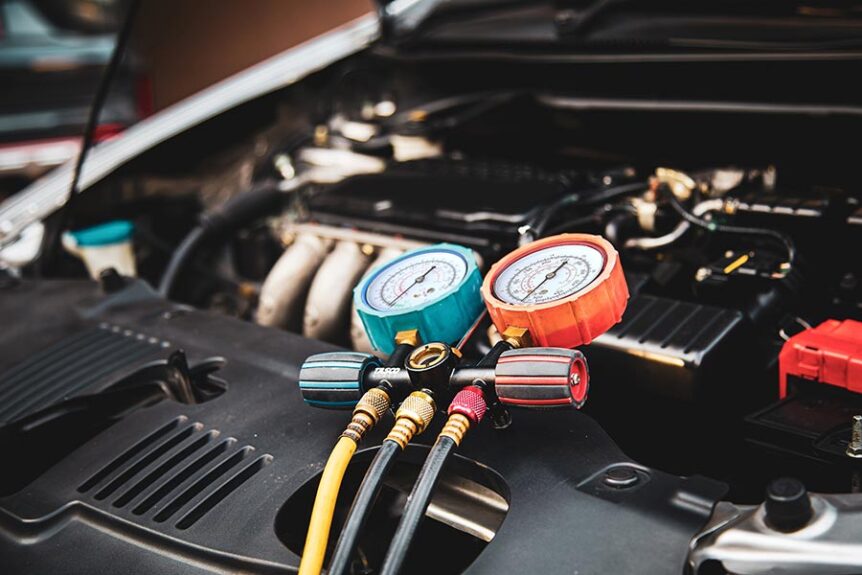Air conditioning diagnostics and repairs are about more than keeping you cool in the summertime. While air conditioning issues are often associated with the hot weather, they can pop up at any time.
What Happens When You Can’t Beat the Heat?
There’s nothing as refreshing as turning on your car or truck’s AC to cool off from the heat. But as the saying goes, “You don’t know what you’ve got until it’s gone”; while this can be applied to many things in life, it’s especially appropriate in the dog days of summer when your vehicle’s air conditioning system decides to give up. Yup, there’s nothing quite as aggravating as hitting the AC only to get stifling air.
Let’s look at air conditioning diagnostics and repairs and how they are another essential component of motor vehicle care. We previously covered how your air system is about more than comfort. Today, we’ll focus on your vehicle’s air conditioning system.
Motor Vehicle Air Conditioning: How Did We Ever Live Without It?
Automotive travel is about more than getting from point A to point B, it’s about getting there in comfort. The first motor vehicle air conditioning system is believed to date back to the early 1930s. Unfortunately, early systems were bulky and expensive, making them both impractical and out of many consumers’ price ranges.
Air conditioning technology improved in the 1950s and by the 1960s, air conditioning was becoming more than a novelty, especially for people who lived in the Southwest. Indeed, the majority of new motor vehicles had air conditioning by then.
While there are still a few motor vehicles that don’t have A/C, they’re a rarity. The days of rolling the windows down and hoping for the best are long gone. However, what do you do when the A/C fizzles in the sizzle?
How Does Air Conditioning Work?
Before we examine air conditioning diagnostics and repairs, let’s look at how your vehicle’s air conditioner works. Your vehicle’s air conditioning is an elaborate system made up of several parts including the following:
- Compressor
- Condenser
- Evaporator
- Metering Device
- Hoses or Lines
- Refrigerant
An issue with any one of these components can diminish or negate your vehicle’s air conditioning system. That’s why it’s essential to recognize any warning signs.
Warning Signs
Some warning signs are obvious. You turn on your air conditioning and you don’t get any cool air. The vehicle’s air may feel cool but not up to the usual levels. You may hear odd noises coming from the vents. In other cases, you may detect an unpleasant odor emanating from the vents. Finally, the air pressure may not match the setting you have the AC on. For example, you set the AC blower to high and it feels like the lowest setting.
Common Causes
Your air conditioning system may be working inefficiently or it may not work at all. Some causes of air conditioning problems are a blocked vent, a blown fuse, a frozen AC line, a refrigerant leak, or a problem with your air conditioning belt.
You may be able to find these problems by checking under the hood or under the car. However, not everyone wants to do this. Furthermore, what if the cause of the problem isn’t obvious?
An Array of Potential Problems
As we’ve seen, air conditioning systems are complex which means problems can stem from several factors. For example, what if the air coming out of your vents isn’t cool when you activate it? The problem could be insufficient refrigerant, a refrigerant leak, or a broken compressor.
Some Overlooked Reasons for Maintaining Your Vehicle’s A/C
There are other reasons for maintaining your vehicle’s air conditioning system besides comfort. First, air conditioning is known to reduce a vehicle’s fuel efficiency. Second, there are environmental concerns with the refrigerants used in air conditioning which means you don’t want to have them leaking into the atmosphere. Finally, diagnosing a problem early can save you from having to make expensive repairs as the problem worsens.
Special Requirements for Working on Air Conditioning Systems
Working on an air conditioning system requires special certification. The Environmental Protection Agency (EPA) requires motor vehicle technicians to obtain EPA 609 certification. This certification is “specifically focused on dealing with refrigerants. Repairing leaks, testing for them and topping off an AC system all require using these chemicals.”
Air Conditioning Diagnostics and Repairs: Good in All Seasons
As we’ve seen, maintaining your vehicle’s air conditioning system is essential regardless of the season. Unlike some areas of maintenance or repair, your vehicle’s air conditioning may require a certified technician. Rest assured that Berube’s technicians are certified in all areas of air conditioning and can handle the job for you.
If you find yourself in the Lewiston, Maine area, bring your vehicle to Berube’s Complete Auto Care for air conditioning diagnostics and repairs. We can answer all your questions about this or any other help you need. Our highly-trained team of technicians are waiting to provide you with whatever your motor vehicle needs.

